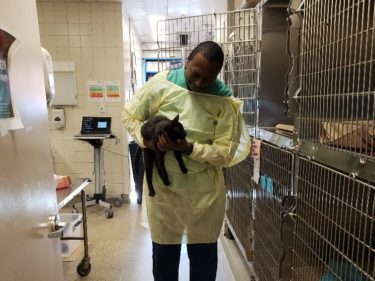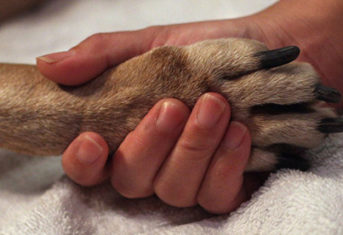Everyday Medicine: Hospital Wards

Everyday Medicine: Hospital Wards
“Everyday Medicine” is an intermittent series of blog posts highlighting tests, treatments, and procedures common in daily Animal Medical Center practice. Some past examples of this type of blog post include physical examination and vomiting or regurgitation. Today’s post focuses on the types of hospital wards your pet would stay in at AMC.
If you have been unlucky enough to be hospitalized, you know a human hospital is divided into a variety of different wards,usually by types of diseases: maternity ward, surgery ward, cardiac care, pediatric, and so on. AMC is also divided into wards, but a little bit differently since dogs and cats don’t have heart attacks and puppies and kittens are usually born at home. Even with the different types of hospital wards, AMC still has veterinarians and technicians on duty 24/7. Overnight there are always at least two veterinarians in the hospital.
ICU-Intensive Care Unit
In the ICU, you will find no more than the 21 sickest patients in the hospital, because that is the number of cages available in our ICU. These are patients that need constant monitoring because they have unstable vital signs.
The types of patients hospitalized in ICU include those requiring oxygen therapy for pneumonia or heart failure, glucose monitoring for diabetes, seizure watches, and any patient who is so sick they are recumbent and require intensive care. Each patient in ICU has a service directing their care and also a veterinary technicians assigned for treatments and monitoring.
SCU-Special Care Unit
In a human hospital AMC’s SCU might be called a step-down ward. When patients recover enough to leave ICU, but are not quite ready to go home, they transfer to SCU. SCU is also home to patients admitted for the day for a procedure or following surgery when ICU-level care is not indicated.
ER-Emergency Room Ward
AMC’s ER is only a short-term stay ward. Pets evaluated by AMC’s Emergency and Critical Care staff are typically treated and discharged or hospitalized in ICU or SCU. A few may stay in the ER for several hours. Those pets landing a spot in ER might be a dog with a difficult birth, a pet with a laceration that requires anesthesia for repair, or an acutely ill animal waiting for blood tests or diagnostic imaging results to direct the treatment plan.
Avian and Exotic Pet Ward
In some ways, the avian and exotic pet ward is our most specialized ward. This ward has “hospital beds” to accommodate birds, bunnies, reptiles, and other small mammals. The ward has auxiliary heating since some exotic pets need a warmer environment than dogs and cats, and the cabinets and shelved are stocked with medications and equipment not found elsewhere in the hospital.
Isolation Ward
Like any isolation ward, AMC hosts pet with contagious diseases. The most common diseases requiring isolation procedures include parvovirus and both canine and feline upper respiratory infections.
Designed to protect other pets from contracting an infectious disease, the isolation ward has restricted entry, a requirement for staff to wear protective gear, and a ventilation system that prevents contaminated air from circulating in the hospital. Cameras connect the patients to their care team.
I hope your pet never needs our ICU, SCU, ER, avian and exotic pet or isolation wards, but if they do, you now know how carefully they will be cared for while they are with us.

































